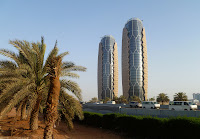When looking at modern Qatar, it’s easy to imagine the great Oriental scholar, Edward Said, turning in his grave. Nineteenth-century Western travellers to the Middle East went in search of an imagined Arabia. When they couldn’t find it, they described an Orient they thought their readers would prefer to the reality. Even today, it’s tempting to go searching for such stereotypes and Qatar has its share: there are rock carvings to testify human endurance pitched against adversities of nature; forts to hint at the ruins of empire; and occasional goat-hair Bedouin tents to suggest the ‘noble savage’ nature of life in the desert.
Qatar has spent its energies (and considerable fortunes) in eschewing this stereotype, however, and showing that these ‘Orientalist’ flights of fancy are more a product of feverish Western imaginations than anything related to the Middle East. To this end, vast vertical ‘pleasure domes’ of the postmodern variety have been erected in Doha as if to demonstrate that the country is as international as any other. At least, that was until recently. Suddenly, wind-towered developments like Al-Sharq Village Resort & Spa proclaim to be ‘genuinely Arabic’; Al-Waqif souq sports ‘antique’ passageways; tented accommodation in Khor al-Adaid comes with air-conditioning. Qatar, in other words, appears to be reinventing itself in the image of Western ‘otherness’ fantasies. For the visitor, it’s wonderful: everything one imagined of Arabia is there in all its sanitised glory. For those who knew the Qatar of hawk souqs and dust storms, however, there’s the suspicion that this country is turning Disney.
Show in Lonely Planet
























Nice post on Qatar.
ОтветитьУдалитьhttp://rajniranjandas.blogspot.in
I've never been there but your photos are simply great. :-)
ОтветитьУдалитьHave a nice weekend
Christa